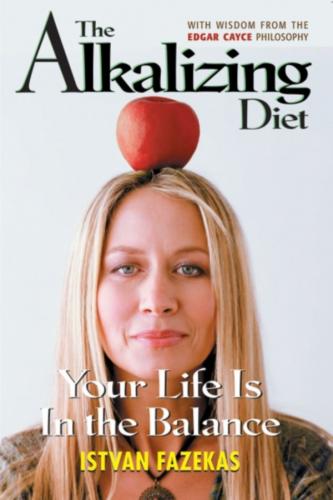The Alkalizing Diet
The Alkalizing Diet
Your Life Is in the Balance
Istvan Fazekas
Copyright © 2005
by Istvan Fazekas
5th Printing, February 2011
Printed in the U.S.A.
All rights reserved. No part of this book may be reproduced or transmitted in any form or by any means, electronic or mechanical, including photocopying, recording, or by any information storage and retrieval system, without permission in writing from the publisher.
A.R.E. Press
215 67th Street
Virginia Beach, VA 23451–2061
Library of Congress Cataloguing-in-Publication Data
Fazekas, Istvan, 1964-
The alkalizing diet : your life is in the balance / by Istvan Fazekas.
p. cm.
ISBN 0–87604–510–7 (trade pbk.)
ISBN 13: 978–0–87604–510–7 (trade pbk.)
1. Nutrition. 2. Food combining. 3. Acid-base equilibrium. 4. Cayce, Edgar, 1877–1945. I. Title.
RA784.F39 2005
613.2—dc22
Disclaimer 2005013341
The information in this book is not intended to replace medical advice. You should consult your physician regarding any general or specific physical symptoms. The author and publisher disclaim any responsibility for adverse effects resulting from information in this book.
Edgar Cayce Readings © 1971, 1993–2007
by the Edgar Cayce Foundation.
All rights reserved.
Cover design by Richard Boyle
Contents
Introduction
AMERICANS SHOULD BE THE HEALTHIEST PEOPLE ON THE PLANET. WE spend the most money per capita on health care and have the most medical technology at our disposal of any industrialized nation. But we are not—not really. We are getting more obese, and the risk of resultant pathologies because of our expanding frames is also increasing. A January 2002 Harris polli states the following:
Fully 33% [of Americans] are now 20% overweight, a reasonable measure of obesity, compared to 15% in 1983, 16% in 1990, and 22% in 1995. In other words, obesity has more than doubled from less than one-sixth of the population eighteen years ago to one-third today. [Author’s emphasis]
The idea of one-third of 293 million people being obese—about 98 million Americans—is a startling statistic.ii Is our ever-growing weight problem the main cause of our nation’s health concern? It is our overall lifestyle, with diet being the number two factor right behind the nefarious nicotine nemesis.
According to the Centers for Disease Control, in 2000 the most common actual causes of death in the United States were tobacco use (435,000), poor diet and physical inactivity (400,000), alcohol consumption (85,000), microbial agents (e.g., influenza and pneumonia, 75,000), toxic agents (e.g., pollutants and asbestos, 55,000), motor vehicle accidents (43,000), firearms (29,000), sexual behavior (20,000), and illicit use of drugs (17,000).iii
Almost a million people a year die as a direct result of poor diet, lack of physical activity, smoking, and excessive drinking! (See Figure 1.) Those statistics are likely quite conservative. We have a skyrocketing obesity rate and appear to be victims of our own advancements in comfort and convenience. When health problems are the result, we rely exceedingly on technology to aid us in our time of disease.
